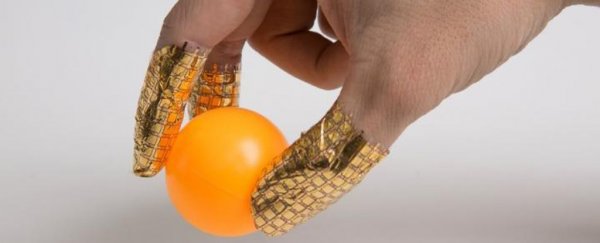Scientists have developed a flexible and transparent pressure sensor that can maintain its accuracy even when curved around soft surfaces like human skin.
The sensor, measuring just 8 micrometres thick, can detect pressure in 144 locations at once, and might one day enable health workers to physically screen patients for things like breast cancer tumours using pressure-sensitive gloves incorporating the technology.
While conventional pressure sensors already offer some flexibility, they lose their accuracy when twisted or wrinkled, and are significantly thicker, at about 100 micrometres. By contrast, the bendable, super-thin sensor developed by engineers in Japan and the US retains its sensitivity even when conforming to extremely curved surfaces.
According to the researchers, their sensor retains its accuracy when bent over a radius of 80 micrometres – equivalent to just twice the width of a human hair. While it's unlikely most health workers would ever need to monitor such intensely small curves, it shows just how far the new sensor could help us in measuring pressure in rounded physical objects.
"Flexible electronics have great potential for implantable and wearable devices," said lead researcher Sungwon Lee from the University of Tokyo. "I realised that many groups are developing flexible sensors that can measure pressure but none of them are suitable for measuring real objects since they are sensitive to distortion. That was my main motivation and I think we have proposed an effective solution to this problem."
To develop their flexible sensor, the team added carbon nanotubes and graphene to an elastic polymer, creating nanofibres with a diameter of 300–700 nanometres. These nanofibres were entangled with one another to form a composite that is both transparent and extremely thin.
Coupled with an integrated sensor matrix measuring just 2 micrometres thick, the resulting nanofibre structure enables pressure measurements that physically weren't possible before.
"Our simulations show that these fibres change their relative alignment to accommodate bending deformation, thus reducing the strain in individual fibres," the authors write in Nature Nanotechnology.
The scientists say their pressure sensor could be used in a range of applications involving soft robotics and medical systems, and have begun preliminary experiments to demonstrate the powers of the nanofibres.
"We've also tested the performance of our pressure sensor with an artificial blood vessel and found that it could detect small pressure changes and speed of pressure propagation," said Lee.
It's not the first time that we've seen researchers work with incredibly thin pressure sensors, but if it can help detect tumours hiding under people's skin, we can't wait to see where this technology leads.
